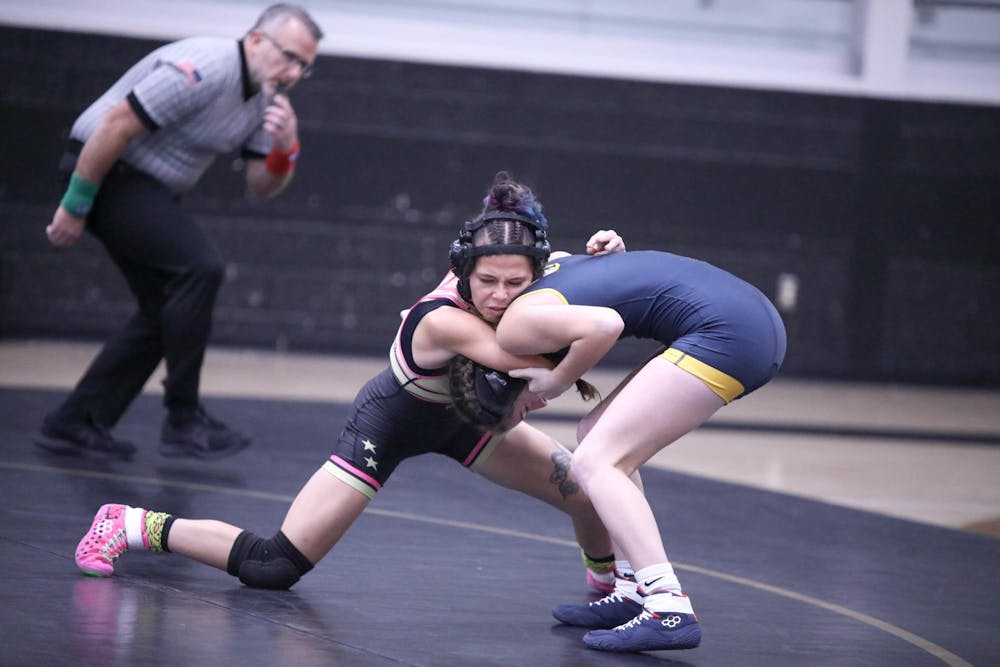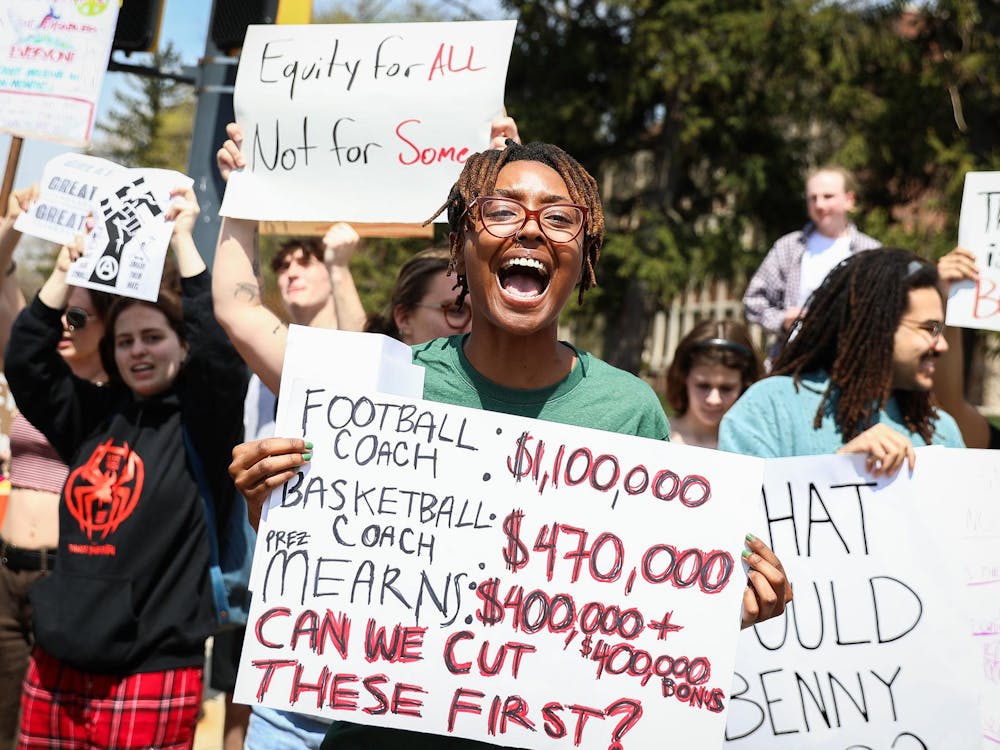When Kynlie Keffer was in the second grade, the current Daleville sophomore started to compete in wrestling. After a while, she found success. After entering high school, she was more than successful – she was just good.
During the 2023-24 season, she finished as state-runner up at the Indiana High School Girls’ Wrestling Association’s (IHSGWA) state finals meet. Later that year, she competed nationally. Now, she’s ranked as the No. 2 girls’ wrestler in Indiana.
Though Keffer proved she was one of the best girl wrestlers in the state – and defeated multiple boys she matched up with – her sport was still not seen as an official sport in the Hoosier State.
“It’s frustrating because you put a lot of work into it and it doesn't really count,” Keffer said.
‘Nobody really knew what was going to happen’
However, the Indiana High School Athletic Association (IHSAA) saw signs of interest in girls’ wrestling and boys’ volleyball. Due to this, the organization decided to bring those two on as ‘emerging sports.’ There are still sports the program is looking into for the future.
“Currently, girls’ lacrosse is the only sport which has become an emerging sport,” IHSAA assistant commissioner Robert Faulkens said via email. “They will need to meet the requisite number of schools participating as well as meeting all other required compliances.”
A sport that becomes an IHSAA emerging sport does not guarantee it will pass and become an official IHSAA sport. Per IHSAA rules, 50 percent of the organization’s members must participate in the sport. Because of this, coaches and IHSAA employees were unsure what would happen.
“Me and a bunch of other coaches talked and we were just kind of concerned how it was going to be handled,” Wes-Del girls’ wrestling head coach Cole Chambers said. “... Nobody really knew what was going to happen.”
But to coaches and wrestlers who were involved, the turnout was just what they needed as the numbers for girls’ wrestling and boys’ volleyball met the required numbers.
According to the IHSAA and commissioner Paul Neidig in a news brief, it was reported April 29, 2024, that 1,444 girl wrestlers represented 177 Indiana high schools.
It was clear schools wanted to compete and due to that, a decision was made that same day. The organization voted to approve both sports as official IHSAA-sanctioned athletics, allowing Indiana to become the 46th state to offer girls’ wrestling as an actual high school sport.
“The [IHSAA] came together because of Title Nine support,” IHSAA assistant commissioner Kerrie Rosati said. “So that way we could have a boy and a girl sport, and then they were given a two-year recognition status … They both met the rule of participating teams.”
Per the IHSAA schedule, the inaugural girls’ wrestling season was slated to begin in October, and for Delaware County high schools, that was a quick turnaround. But to the coaches, a sport like wrestling is easier to include than other sports.
“It’s a blue-collar sport in the sense that we don’t need a lot,” Daleville head coach Dalton Baysinger said. “Once you have a mat, you have a mat. As long as you can facilitate the wrestling room … you're good to go.”

‘Little bit of a challenge’
While area coaches were excited to see the sport get its recognition, questions were raised and some are still unanswered. One of those is what happened last year.
According to Delaware county coaches, if you were a female wrestler and competed against boys last year, you still can this year. But if you didn’t, you have to wrestle against girls.
According to the IHSAA, that is accurate and something its employees don’t see changing. When Faulkens was asked about the possibility of updating the rule, it was a simple answer.
“No,” he said.
While the sport of girls’ wrestling is now an IHSAA sport and the sport itself won’t change, there are new rules. For example, the setup for the state tournament differs from the IHSGWA as there will be a sectional meet, a regional meet and a state final’s meet. Some coaches prefer there also be a semi-state meet.
Changes like this have caused some discussion with IHSAA members and coaches. However, the IHSAA believes that some people don’t understand everything that goes into these decisions. When asked about the organization being criticized for things – which include things like transfers and items away from girls’ wrestling – Faulkens said it’s a struggle.
“Your last question is the biggest obstacle we face,” he said. “We have to do a better job of getting accurate information out to people.”
Currently, five area schools have at least a girl wrestler or an actual team. Those include Wes-Del, Daleville, Wapahani, Muncie Central and Cowan. Four of those schools are on the IHSAA Class 2A and 1A levels and are some of the smaller institutions in Delaware County.
For athletic directors who already have to govern many sports for their respective schools, this was another task they had to add to their list. Two of those area schools that were behind girls’ wrestling from the beginning are Wes-Del and Daleville.
Though both schools had no issue bringing on a girls’ team, scheduling matches did become an issue, per athletic directors and coaches.
“I know that's a tough thing, especially for these small schools that are just starting it up,” Wes-Del athletic director Matt Nuckols said. “Most of these small schools are working with four to six girls, and we have these rules on how many events they can compete in…So that's kind of been a little bit of a challenge there.”
But just because two new sports were added, it doesn't mean schools are going to automatically take them on. That’s the case when it comes to Delta High School and Delta athletic director Tilmon Clark.
Though Delta is one of the bigger schools in the area as far as enrollment numbers – 786 as of 2023 per the U.S. News and World Report – getting everything ready for a new sport still takes money and time.
It also needs more oversight as well. Finding someone to run the matches, work the scorer’s table and other things needed would require an athletic director’s time.
“I think that's a fluid situation,” Clark said, “Obviously, as I continue to evaluate what's best for our student-athletes or what's best for our school, those things can change. It can change quickly.”

‘It’s definitely a lot more fun’
But now that it’s here, schools that offer girls’ wrestling are seeing interest increase. Per Baysinger, the Broncos had two girl wrestlers last season, and they already have nine this season. They also have around nine middle school girls’ wrestlers, and if they continue at the next level, Daleville could have as many as 15 girl wrestlers in the next two to three years.
Because of that, members want to see the sport become just as prominent as boys’ wrestling. To them, the attention and support could show children that everyone can wrestle at the high school level. The state finals will be held in Indianapolis at Corveta Coliseum, and coaches hope it’s as big of a spectacle as the boys' event.
As far as how the IHSAA has handled the transition, most coaches believe it’s been positive thus far.
“[The IHSAA] has handled the change well, but it’s still uncharted territory,” Baysinger said. “I’ve never been a part of sanctioning a sport previously and I don’t know the ins and outs.”
While coaches like Baysinger have to split their time by both coaching the boys’ and girls’ wrestling teams, all that matters to them is that both genders get to experience the sport. When Chambers attended and wrestled at Wapahani High School, he didn’t then and still doesn’t feel the sport gets the credit or recognition it deserves.
“Nobody really cared about it,” he said. “With the growth of the women's perspective of wrestling, it's been blowing up over the last few years, and especially now that it’s sanctioned… It's getting more wrestling for everybody. It might get somebody that's never done sports who wants to have a little violence to put into something.”
While the coaches have a vision of what the future could hold, girl wrestlers are just excited to have a place to come together, compete and enjoy their sport.
“We’ve seen more girls than ever come out and try it,” Keffer said. “[Because of that], it’s definitely a lot more fun.”
Contact Zach Carter via email at zachary.carter@bsu.edu or via X @ZachCarter85.





